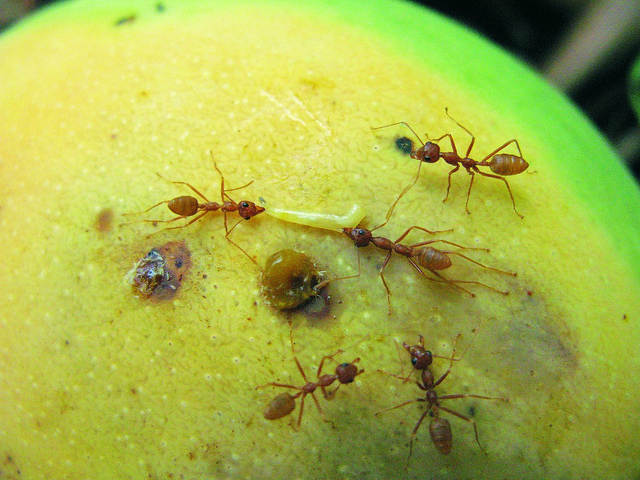Send to a friend
The details you provide on this page will not be used to send unsolicited email, and will not be sold to a 3rd party. See privacy policy.
Patrols of ants on cashew nut trees can roughly double the yield of the crop, according to researchers in Benin.
The researchers say that African weaver ants (Oecophylla longinoda) are an effective natural way to reduce considerable losses of cashew nuts from insect pests, such as fruit flies, and improve cashew quality, on farms in many African countries.
Cashew is a highly valued commodity in Benin, where the nuts have overtaken cotton to become the top export. It is also important elsewhere in Africa. But pests can destroy up to 80 per cent of the crop.
The researchers compared three methods of ant-based pest control on trees with existing ant populations. On the first set, the ants were left as they were. On the second, they were fed sugar solution. A third set were sprayed with an organic pesticide that kills fruit flies. Finally, as a control, some trees had sticky bands placed around their main stem so no ants could reach them.
The research, published on 16 February in Agricultural and Forest Entomology, found that all treatments involving ants increased the cashew nut yield (see chart).
Compared with the ant-free control plants, the yield increased by 78 per cent on plants with the ants alone, by 122 per cent on plants with ants fed with sugar and by 151 per cent on plants with ants that were sprayed with pesticide.
Interestingly, the researchers saw that a higher proportion of nuts on the ant-treated plants were damaged by thrips. These insect pests “have a great effect on the quality of nuts, scarring the leaves, flowers and fruits, leading to deformity and nut abortion”, says Florence Anato, an author of the study and an agricultural scientist at Benin’s Université d’Abomey-Calavi.
But the study says the net increase in nut yield outweighed this damage.
The paper was based on a two-year study involving partners including Aarhus University in Denmark and the International Institute of Tropical Agriculture (IITA), with funding from Danida, Denmark’s agency for development assistance.
Biologist Jean-François Vayssières, who leads a project looking at controlling the West African fruit fly and is based at the IITA, says the study shows that ants could significantly improve cashew yield.
“The presence of weaver ants patrolling the trees provides protection against pests,” he says. “They can have a direct impact by capturing insects as prey, through excretions that act as a repellent or simply by their physical presence.”
Vayssières adds that his fruit fly project has “already shown that the ants’ pheromones also have a repellent effect on fruit flies. However, further extensive research is needed to get the maximum benefit from the presence of these ants in our plantations.”
A version of this story originally appeared in SciDev.Net’s Sub-Saharan Africa French edition.
References
Florence M. Anato Reducing losses inflicted by insect pests on cashew, using weaver ants as a biological control agent (Agricultural and Forest Entomology, 16 February 2015)














